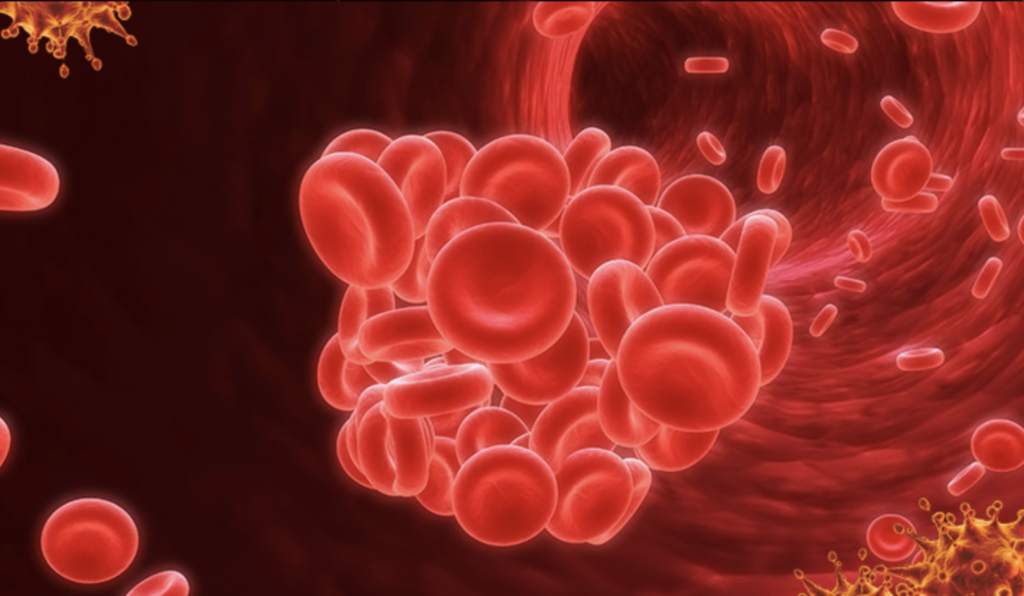
Yale News
A recent study involving researchers at the School of Medicine found that prescribing anticoagulants could be effective in preventing COVID-19 deaths.
The paper was published this month in the British Medical Journal and shows that patients given preventative doses of anticoagulants — drugs that prevent blood clotting — within the first 24 hours of being hospitalized with COVID-19 have a mortality rate that is 30 percent lower than that of patients who are not given this medication. The research was done in collaboration with experts at the School of Medicine, London School of Hygiene & Tropical Medicine, Vanderbilt University Medical Center and the U.S. Department of Veterans Affairs.
“We noticed that early on in the coronavirus pandemic, deaths from COVID-19 were partially attributed to the formation of blood clots that have led to more serious thromoblic events like lung failure, heart attack and stroke,” Chris Rentsch, lead author of the study and assistant professor of epidemiology at the London School of Hygiene & Tropical Medicine, said. “These cases were quite common in patients with severe cases of COVID-19. We thought to ask the question … anticoagulants prevent the formation of blood clots in COVID-19 patients, which might confer benefit in terms of protecting COVID-19 patients from mortality.”
In order to conduct this study, the researchers drew upon real-world observational data from electronic medical records from healthcare groups within the VA, the largest integrated healthcare system in the United States, from March 1 to July 31 of 2020.
Of the 4,297 patients included in the study who were hospitalized for COVID-19 during that time period, 84 percent received prophylactic anticoagulation medication of either heparin or enoxaparin within 24 hours of being hospitalized.
These individuals who were able to receive anticoagulation medicine were closely observed, to keep track of who died or experienced serious bleeding within 30 days of hospital admission. The observations were then compared to data from patients who did not receive anticoagulants in the first 24 hours of hospital admission.
“One of the most challenging things about using observational data is having to account for confounding information,” Amy Justice, one of the authors of the study and a professor at the School of Medicine, said. “If you don’t account for that, the analysis may appear to show that either benefit or harm is associated with a medication, when in reality it has more to do with the way that medication is prescribed to specific individuals with preexisting conditions.”
In order to overcome the issues associated with confounding results, where extra variables could complicate explanations for an observed relationship between two variables, the data were randomized prior to analysis in order to reduce bias.
According to Rentsch, there was an overwhelmingly large number of people from which they could have possibly extracted data. The excess of potential data and the need to quickly find evidence amid the increasing impact of the pandemic also contributed to the difficulty of data collection, processing and interpretation.
The study found that 14.3 percent of patients who received prophylactic, or preventative, anticoagulation and 18.7 percent of patients who did not receive the medication died within thirty days of hospital admission. From these numbers, the researchers concluded that there was an absolute relative risk decrease of 27 percent.
Rentsch explained that the researchers were “mostly surprised by how robust the results were with regards to the number of sensitivity analyses they performed.”
“We conducted around 10 sensitivity analyses to see if our estimates from the primary analyses changed under different sets of assumptions,” he said. “Our primary conclusions did not change in any of the additional analyses undertaken.”
The unchanging nature of the primary conclusions therefore suggests that the results can withstand scrutiny.
Matthew Freiberg, professor of Cardiovascular Medicine at Vanderbilt University and one of the study authors, said that the results were not surprising due to previously known information about blood clotting complications in COVID-19.
“Our hypotheses were that treating patients with prophylactic anticoagulation would lead to a lower risk of mortality — likely due to reducing some of the risk associated with a hypercoagulable state,” Freiberg wrote in an email to the News. “This is conducive with what we know from clinical observations, including autopsy data, that suggests that people who have severe covid often have an incredible amount of clotting, both in venous and arterial systems, so there was already a fair amount of concern that covid might affect people with severe diseases.”
To further develop this study, the researchers are also interested in determining whether providing anticoagulation at higher doses provides any further benefit than the prophylactic doses used upon initial hospitalization.
Rentsch said the researchers are also considering repeating their study with individuals who have been on full dose blood thinning medications prior to getting COVID-19, to determine if outcomes would differ in that case.
“We eagerly await the results of ongoing clinical trials, particularly those investigating whether this therapy should be given to non-hospitalized people newly diagnosed with COVID-19,” Rentsch said.
As of Thursday evening, there have been 28.4 million COVID-19 cases in the United States.
Mai Chen | mai.chen@yale.edu








